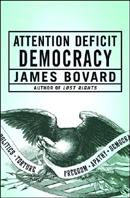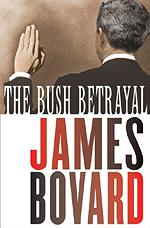President Bush has once again decreed that his personal pen is the highest law of the land. In a statement issued on October 4, 2006, he announced that he would ignore many provisions of the Homeland Security appropriations act he signed earlier in the day. His action vivifies that the rule of law now means little more than the enforcement of the secret thoughts of the commander in chief.
Bush’s postsigning statement declared that he would interpret many sections of the new law “in a manner consistent with the president’s constitutional authority to supervise the unitary executive branch.” In plain English, this means that many of the limits that Congress imposed on Bush’s power — and that he accepted when he took the money Congress appropriated — are null and void. Why? Because the president says so.
The new law declared that only the Homeland Security Department’s privacy officer could alter or delay the department’s mandatory report on how its actions and policies affected Americans’ privacy. Congress included this safeguard because of the Bush administration’s long record of intruding into Americans’ lives — from the Total Information Awareness system, to vacuuming up information on airline passengers, to stockpiling phone records of millions of citizens.
After he signed the bill, Bush announced that he is effectively entitled to edit the report as he pleases. But his “right to edit” means that he is entitled to delete information and thereby prevent Congress from learning of how the feds continue to shred privacy.
Bush pulled the same trick in March after he inked a renewal of the USA PATRIOT Act, announcing that he would scorn notifying Congress on how the feds are using PATRIOT Act powers. Bush declared that he would interpret the law “in a manner consistent with the president’s constitutional authority to … withhold information.” Bush is apparently convinced that he is entitled to govern in secrecy, and any provision of a law to the contrary violates his imperial prerogatives.
George W. Bush has added more than 800 “signing statements” to new laws since he took office. Earlier presidents occasionally appended such comments to new statutes, but Bush is the first to use signing statements routinely to nullify key provisions of new laws.
The “unitary executive” doctrine assumes that all power rests in the president and that checks and balances are an archaic relic. This is the same “principle” the Bush administration invoked to deny Congress everything from Iraqi war plans to the records of the Cheney Energy Task Force. Bush has invoked the “unitary executive” doctrine almost 100 times since taking office, according to Miami University professor Christopher Kelley.
The American Bar Association recently declared that Bush’s signing statements are “contrary to the rule of law and our constitutional separation of powers.” The Congressional Research Service reported last month that Bush is using such statements as part of his “comprehensive strategy to … expand executive power.”
Apparently, the government is no longer obliged to obey any law that Bush does not personally approve. At a June congressional hearing, Sen. Ted Kennedy (D-Mass.) asked Justice Department lawyer Michelle Boardman for a list of all the laws that Bush has declared will no longer be enforced. Boardman replied, “I cannot give you that list.”
 How can we know which laws Bush approves of? It’s a secret. Bush’s personal thoughts thus become the ultimate law of the land. No one can know whether the government is violating the “law” because Bush has not publicly declared what the law is.
How can we know which laws Bush approves of? It’s a secret. Bush’s personal thoughts thus become the ultimate law of the land. No one can know whether the government is violating the “law” because Bush has not publicly declared what the law is.
Americans may have to wait many years to learn what the rule of law meant in 2006. The truth may be suppressed until Bush’s aides begin publishing their memoirs or until the Supreme Court has a change of mood and decides that the executive branch is not entitled to boundless secrecy.
 So what is the meaning of “limited government” in the Bush era? Merely that the courts and Congress must be prohibited from limiting the president’s power. Bush’s signing statements are building blocks for dictatorship. The longer he builds, the darker America becomes.
So what is the meaning of “limited government” in the Bush era? Merely that the courts and Congress must be prohibited from limiting the president’s power. Bush’s signing statements are building blocks for dictatorship. The longer he builds, the darker America becomes.



